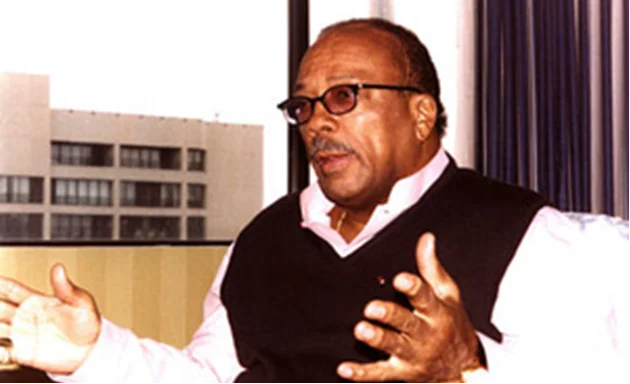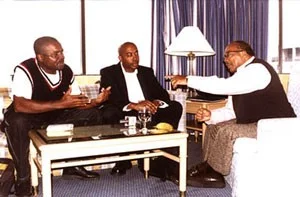
Phil Vassell —
December 1, 2001
Quincy Jones has seen it all.
With a career that spans over 50 years in music, television and film, there’s very little that he hasn’t done either. He’s won a total of 26 Grammy awards, produced the biggest-selling record of all times — Michael Jackson’s 40 million seller, Thriller; been honored by the French government, hangs out with Nelson Mandela, and most recently, was given a special World Leader award by Toronto’s Harbourfront Centre. So, sitting down with this cultural icon who has simultaneously released his autobiography and a four-CD boxed set, there was much to discuss. To many, Quincy is an enigma. He’s been able to anticipate some of the biggest trends over the years while other artist/producers/trend-spotters have lost their touch. One thing, however, remains absolutely clear– the 68 year old renaissance man is not about to chill and play golf in Hawaii. Here are some excerpts from our interview:
Quincy on music making the difference in the life a young man born on the south side of Chicago and then growing up in Seattle:
Music SAVED my life. It did! We took some ex-gang bangers over to South Africa when Mandela asked me to be a co-host with him. The thing was from South Central to South Africa. You’re talking about incest, heroin, three generations of uncles killed by or who are members of the bloods and crips and all of that. What it is — is that all that energy is misplaced. It’s amazing energy because it has to do with economics, leadership, strategy, everything. It’s illegal! But it’s definitely got a CEO spine though — if you’re put in a CEO situation.
Jim Brown has a group called, Amer-I-CAN. They’re a rolodex of all the black convicts, prisoners, juvenile delinquents and gang members. And Jim will come over to the house some day and will have these 15 brothers sit there. And they’ll have these three piece suits on, shaved, looking like they came out of Oxford, and they’ve got jobs– $100,000, $150,000 a year. And he says, run it down: 15 years for armed assault, you know, and they have all changed. Changed and not only that, they’ve helped them change the other brothers. So I’m really into that, you know. Just think of what could be if it’s only one percent that could be saved – just working all the energy there. It just means a lot to me you know. Cause, we’ve all been there and know how close it can be. It’s just a very thin line you know. So, I’m very sensitive to it.
On the power of Black music to affect change:
It’s always been soul food, you know. I’ve been an advocate for a long time of establishing a ministry of culture. Canada has one. France has one, America doesn’t have one. Sad. We should have a ministry of culture. For a country that has the most powerful music that the entire PLANET chose to adopt as their voice — the desperado of the world – young people all over the world– that’s their music! Whether it’s hip-hop, whether it’s delta, whether it’s New Orleans, whatever. It’s the essence. They didn’t take bag pipes or whatever. They took black music. Everybody in the world knows it! Tell those brothers in New York — New York doesn’t know it.
On Rappers as the 3rd entity:
I remember L.L asked me when I first met Russell Simmons in 1985, I went up to his place and L.L, who was 15 then, said, ‘Mr. Jones, what do the musicians and singers think about us?’ And I got it. That’s the first time I realized that rappers do not identify with musicians or singers. It’s the third entity. What they don’t know is their real roots are praise shouters, praise singers from Africa and griots– oral historians. Rappers have a platform that’s amazing, but they ain’t talking about nothing. I mean there’s always an exception, with Roots and Mos-Def, KRS-One, you know who they are.
Quincy on whether hip hop artists should take greater responsibility for their music:
Not only take more responsibility, but to mend. The coalition that Russell is trying to put together now — we did a summit like that seven years ago – VIBE, Suge, Dr. Dre, Biggie was there, everybody was there….
They could have totally revolutionized the education system, totally. All over the world, totally revolutionize the system. Because the teachers are underpaid, taking all that abuse, and all of that, disrespect and everything else. And I’ve seen it man, when a dude understands beats and rhymes and has the same knowledge the teacher has, he commands attention like that (snaps).
On the similarities between hip hop and jazz:
A lot of similarities. Anti-radio, radio was against it. The rappers rapped for each other like the be-boppers played for each other. Be-boppers made a bigger leap because it was not timely and they didn’t want to be entertainers anymore. They didn’t wanna shuffle up, they didn’t wanna sing, they didn’t wanna entertain, and roll their
eyes anymore. And the price was high. They ended up getting alienated, so it ran everybody to the needle. They were an amazing bunch of people except for the heroin.
Quincy on his fusion of various styles of black music — be-bop, hip hop, gospel and Zulu music — on the ground-breaking Grammy award-winning album, Back on The Block:

See the family is almost programmed to be pulled apart all the time and I’m sick of that. I’m not gonna give up what Duke Ellington and all those people went through to get plunger trumpets? And doo-wop. I’m not going to give that up now. I don’t have to give it up you know. We need all of it. You know, because you got a scratcher. That’s another letter in the alphabet, you don’t have to throw everything else out – the baby with the bath water. That is crazy. That’s what’s happening. And we don’t understand our own music.
The role of education system in teaching the history of black music:
The most important key there is. And there’s a lot of people that’s doing it in a renegade way; like Steve Ross’s wife, Courtney Ross who runs the Ross Institute in East Hampton…Like Cuba. Cuba’s got it all man. They’ve got conservatory graduates with strong roots; they know their Yoruban roots; and they got it all. And you see little companies going down there like missionaries. They really have it together, everything. Dizzy (Gillespie) was in that in 1947-1948. The most powerful music on the planet. New Orleans is the only place I know in America where 8 year old kids are playing their roots. They got 8 year old kids walking around the streets doing Louis Armstrong. I love that. You meet young brothers doing the same thing out there in Jackson, Mississippi; because guess what? All B.B. King’s concerts are 97% white. All Miles Davis’ concerts were 97% white. That’s pitiful, it really is.
On music lessons from the British invasion:
We got to be careful man, because we throwing all this stuff away and I saw what happened in the British invasion. I saw the Stones, and the Beatles before they came to the United States. They were unbelievable. I made a bet with McCartney and Lennon, the three of us bet against George and Ringo and Brian Epstein, that the Beatles would not happen in America (laughs out loud). Shows how stupid we were. Because it never happened before. Nobody ever busted the dominance of American music… The English admit to listening to Willie Dixon and Robert Johnson, and Bo Diddley and Chuck Berry. And they wore their ass out! Still are!
Quincy on why the legacy of African American Music is being ignored:
It’s pure unadulterated ignorance. It is. Because you know what happens, when budgets get cut, it all comes down to patrons and it boils down to money. They think they have to pacify the upper echelon of society. Patrons know of classical music. Which is European music. Our classical music man is Miles Davis’ Kind of Blue with Trane and Cannon. That’s our classical music. That’s the classical music of all American music. It is — Miles Ahead; Ellington; Louis; You’re getting in a fight if somebody tells me about Louis being a “Tom.” I don’t want to hear that shit man. I really don’t want to hear it. We wouldn’t be here if it wasn’t for Louis. You know, he spawned all the singers in 1928. He did “West End Blues” and he let the whole world know this is gonna be here; forever. And they’re gonna be the Brahms and Beethoven’s and Bach’s of our country. I’m telling you.
On the rapid changes the music industry is undergoing due to the prevalence of downloading and file sharing of the internet:
Digital distribution is where it should be going, but nobody knows how to make it work. Once you give 32 million kids ideas that they have the divine right to have the music for nothing, you’ve got to do a lot of back tracking. And that’s what they did with Shareware. Actually not a penny was made off of them; Napster– they don’t know how to make a penny, or MP3. And so nobody made money. That’s the thing, nobody has made it pay off yet. It will happen though.
Quincy describes the current internet phase as just the beginning:
It’s just starting. I think the internet got off to a bad start because people got greedy and it wasn’t time yet. When broadband and nanotechnology hits here and silicone and micro-chips– the quarter is almost run out; and carbon and hydrogen atoms– it will turn it upside down. I’m around the guys that build all this stuff; Marvin Minsky is the co-founder of artificial intelligence; Ray Kurzweil; I’m on the board with John Chambers of Cisco– the architects; Oracle. So you see all of the things that are happening. Allan Kay is one of my best friends; he invented Mach I and Mach II and overlapping windows– so you’re watching the evolution of it from the inside out. And I love it man. To me it’s like music.
On the future of the music:
The future of the music is going to be determined by understanding what has already been done with it. If you look at the temples of R&B — it’s Donny Hathaway, it’s Marvin Gaye, it’s Stevie Wonder does Sir Duke and he knows where he’s coming from; so he can constantly go forward; Michael (Jackson), Earth Wind and Fire; they take it to their level. Every time it goes to a mammoth evolution, we have to dip back to the repository of jazz. Cause jazz was designed to eat everything in its path. EVERYTHING. Quadrilles, Marches, Stravinsky, everything, and it’s always been that way from Louis on to James McBride and Joshua Redman. And all those brothers. But the thing is though, that the music is not of their time; so they were really playing against a counter action there. It could be but it’s not. Because people wear their baseball caps backwards — that’s not be-bop — that’s hip-hop. It’s OK too. You just got to combine it!
The Canada Black Music Archives is a non-profit digital archive established as a division of Word Media Group Inc.
contact us
124 - 639 Dupont St. Toronto, ON M6G 1Z4
sponsors and supporters
We are grateful for the support of the TD Bank Group, Province of Ontario, Government of Canada as well as our donors, members and volunteers.





